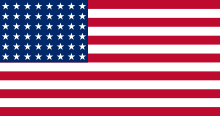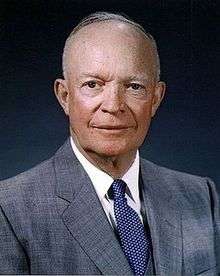1953 in the United States
| 1953 in the United States | |
|---|---|
| Years: | 1950 1951 1952 – 1953 – 1954 1955 1956 |
|
| |
 48 stars (1912–59) | |
|
Timeline of United States history
| |
Events from the year 1953 in the United States.
Incumbents
Federal Government
- President: Harry S. Truman (D-Missouri) (until January 20), Dwight D. Eisenhower (R-Kansas/New York) (starting January 20)
- Vice President: Alben W. Barkley (D-Kentucky) (until January 20), Richard Nixon (R-California) (starting January 20)
- Chief Justice: Fred M. Vinson (Kentucky) (died September 8), Earl Warren (California) (starting October 5)
- Speaker of the House of Representatives: Sam Rayburn (D-Texas) (until January 3), Joseph William Martin, Jr. (R-Massachusetts) (starting January 3)
- Senate Majority Leader:
- until January 3: Ernest McFarland (D-Arizona)
- January 3 – July 31: Robert A. Taft (R-Ohio)
- starting August 3: William F. Knowland (R-California)
- Congress: 82nd (until January 3), 83rd (starting January 3)
Events
January–March

January 20: Dwight D. Eisenhower becomes president
- January 7 – President Harry S. Truman announces the United States has developed a hydrogen bomb.
- January 14 – The CIA-sponsored Robertson Panel first meets to discuss the UFO phenomenon.
- January 19 – 68% of all television sets in the United States are tuned into I Love Lucy to watch Lucy give birth.
- January 20 – Dwight D. Eisenhower succeeds Harry S. Truman as President of the United States.
- January 22 – The Crucible, a drama by Arthur Miller, opens on Broadway.
- February 5 – Walt Disney's 14th animated film, Peter Pan, premieres at Chicago.
- February 11 – President Dwight D. Eisenhower refuses a clemency appeal for Ethel and Julius Rosenberg.
- February 13 – Transsexual Christine Jorgensen returns to New York after successful sexual reassignment surgery in Denmark.
- February 19 – Georgia approves the first literature censorship board in the United States.
- March 17 – The first nuclear test of Operation Upshot–Knothole is conducted in Nevada, with 1,620 spectators at 3.4 km (2.1 mi).
- March 19 – The 25th Academy Awards ceremony is held (the first one broadcast on television).
- March 31 – Due to increasingly lower ridership, Staten Island Rapid Transit closes 2 of its 3 passenger lines (South Beach & North Shore).
April–June
- May 11 – The 1953 Waco tornado outbreak: a F5 tornado hits in the downtown section of Waco, Texas, killing 114.
- May 25 – Nuclear testing: at the Nevada Test Site, the United States conducts its first and only nuclear artillery test: Upshot–Knothole Grable.
- June 8 – Flint–Worcester tornado outbreak sequence: a tornado kills 115 in Flint, Michigan (the last to claim more than 100 lives).
- June 9
- CIA Technical Services Staff head Sidney Gottlieb approves of the use of LSD in a MKULTRA subproject.
- Flint–Worcester tornado outbreak sequence: a tornado spawned from the same storm system as the Flint tornado hits in Worcester, Massachusetts, killing 94.
- June 19 – The U.S. executes Julius and Ethel Rosenberg for spying for the USSR.
- June 30 – The first Chevrolet Corvette is built at Flint, Michigan.
July–September
- July 18 – Howard Hawks's musical film Gentlemen Prefer Blondes, starring Marilyn Monroe and Jane Russell, is released by 20th Century Fox.
- July 26 – The Short Creek raid is carried out on a polygynous Mormon sect in Arizona.
- July 27 – The Korean War ends: the United States, the People's Republic of China, North Korea, and South Korea sign an armistice agreement.
- August 5 – Operation Big Switch: prisoners of war are repatriated after the Korean War.
- August 17 – The first planning session of Narcotics Anonymous is held in Southern California (see October 5).
- August 18 – The second Kinsey Report, Sexual Behavior in the Human Female, on American sexual habits, is issued.
- August 19 – Cold War: the CIA helps to overthrow the government of Mohammed Mossadegh in Iran, and retain Shah Mohammad Reza Pahlavi on the throne (see Operation Ajax).
- August 20 – The United States returns to West Germany 382 ships it had captured during World War II.
October–December
- October – The United States tests the hydrogen bomb.
- October 5 – Earl Warren is appointed Chief Justice of the United States by U.S. president Dwight D. Eisenhower.
- October 10 – Mutual Defense Treaty Between the United States and the Republic of Korea is concluded in Washington D.C.
- October 12 – The play The Caine Mutiny Court-Martial opens at Plymouth Theatre, New York.
- October 30 – Cold War: U.S. President Dwight D. Eisenhower formally approves the top secret document of the United States National Security Council NSC 162/2, which states that the United States' arsenal of nuclear weapons must be maintained and expanded to counter the communist threat.
- December – Hugh Hefner publishes the first issue of Playboy magazine: it sells 54,175 copies at $.50 each.
- December 6 – With the NBC Symphony Orchestra, conductor Arturo Toscanini performs what he claims is his favorite Beethoven symphony, Eroica, for the last time. The live performance is broadcast nationwide on radio, and later released on records and CD.
- December 8 – U.S. president Dwight D. Eisenhower delivers his Atoms for Peace address to the UN General Assembly in New York City.
- December 25 – Amami Islands are returned to Japan after 8 years of United States Military occupation.
Date unknown
Harold Butler and his first partner opened Danny's Donuts (later Denny's) in Lakewood, CA in 1953.[1]
Ongoing
- Cold War (1945–1991)
- Second Red Scare (1947–1957)
- Korean War (1950–1953)
Births
- January 1 – Gary Johnson, Candidate for President of the United States
- January 4 – James Warren, journalist and publisher
- January 5 – Steve Archer, singer-songwriter and producer
- January 15 – Kent Hovind, Christian fundamentalist evangelist and tax protester
- January 20 – Jeffrey Epstein, financier and philanthropist
- January 23 - Robin Zander, singer and guitarist (Cheap Trick)
- January 24 - Tim Stoddard, baseball player and coach
- January 29
- Caesar Cervin, soccer player and coach
- Dennis Delaney, actor and playwright
- Steve March-Tormé, singer-songwriter
- Louie Pérez, singer-songwriter and guitarist
- Dwight Takamine, lawyer and politician
- February 11 – Jeb Bush, 43rd Governor of Florida from 1999 till 2007, second son of former President George H. W. Bush and former First Lady Barbara Bush; younger brother of former President George W. Bush; and the older brother of Neil Bush, Marvin Bush, and Dorothy Bush Koch
- March 2 – Russ Feingold, United States Senator from Wisconsin from 1993 till 2011.
- March 26 – Lincoln Chafee, United States Senator from Rhode Island from 1999 till 2007.
- April 16
- Douglas M. Fraser, general
- J. Neil Schulman, author, actor, director, and producer
- May 12 – Kevin Grevey, basketball player and sportscaster
- May 26 – Kay Hagan, United States Senator from North Carolina since 2009.
- June 10 – John Edwards, United States Senator from North Carolina from 1999 till 2005.
- June 13 – Tim Allen, comedian, actor, voice-over artist, and entertainer and Debbie Davis from Texas, teacher, trail blazer
- July 24 – Claire McCaskill, United States Senator from Missouri since 2007.
- July 28 – Don Black, white supremacist
- October 18 – Brian David Mitchell, criminal
- October 25 – Ajamu Baraka, human rights activist and the Green Party's nominee for Vice President of the United States in the 2016 election
- November 14 – Phil Baron, voice actor, puppeteer, and songwriter
- November 15 – James Widdoes, actor, director, and producer
- December 10 – Chris Bury, journalist and academic
- December 13 - Larry Doby, 7-time all star black baseball player
Deaths
- January 1 – Hank Williams, country singer-songwriter (born 1923)
- January 7 – Osa Johnson, adventurer and filmmaker, wife of Martin Johnson (born 1894)
- May 30 – Dooley Wilson, African American actor, singer and drummer (born 1886)
- June 3 – Florence Price, African American classical composer (born 1887)
- September 2 – Jonathan M. Wainwright, general (born 1883)
- September 5
- Francis Ford, actor and director (born 1881)
- Rudolf Höber, physician (born 1873 in Germany)
- September 8 – Fred M. Vinson, Chief Justice of the U.S. (born 1890)
- September 13 – Mary Brewster Hazelton, portrait painter (born 1868)
- September 28 – Edwin Hubble, astronomer (born 1889)
- November 21 – Larry Shields, dixieland jazz clarinetist (born 1893)
- November 27 – Eugene O'Neill, playwright (born 1888)
See also
References
External links
-
 Media related to 1953 in the United States at Wikimedia Commons
Media related to 1953 in the United States at Wikimedia Commons
This article is issued from Wikipedia - version of the 11/17/2016. The text is available under the Creative Commons Attribution/Share Alike but additional terms may apply for the media files.